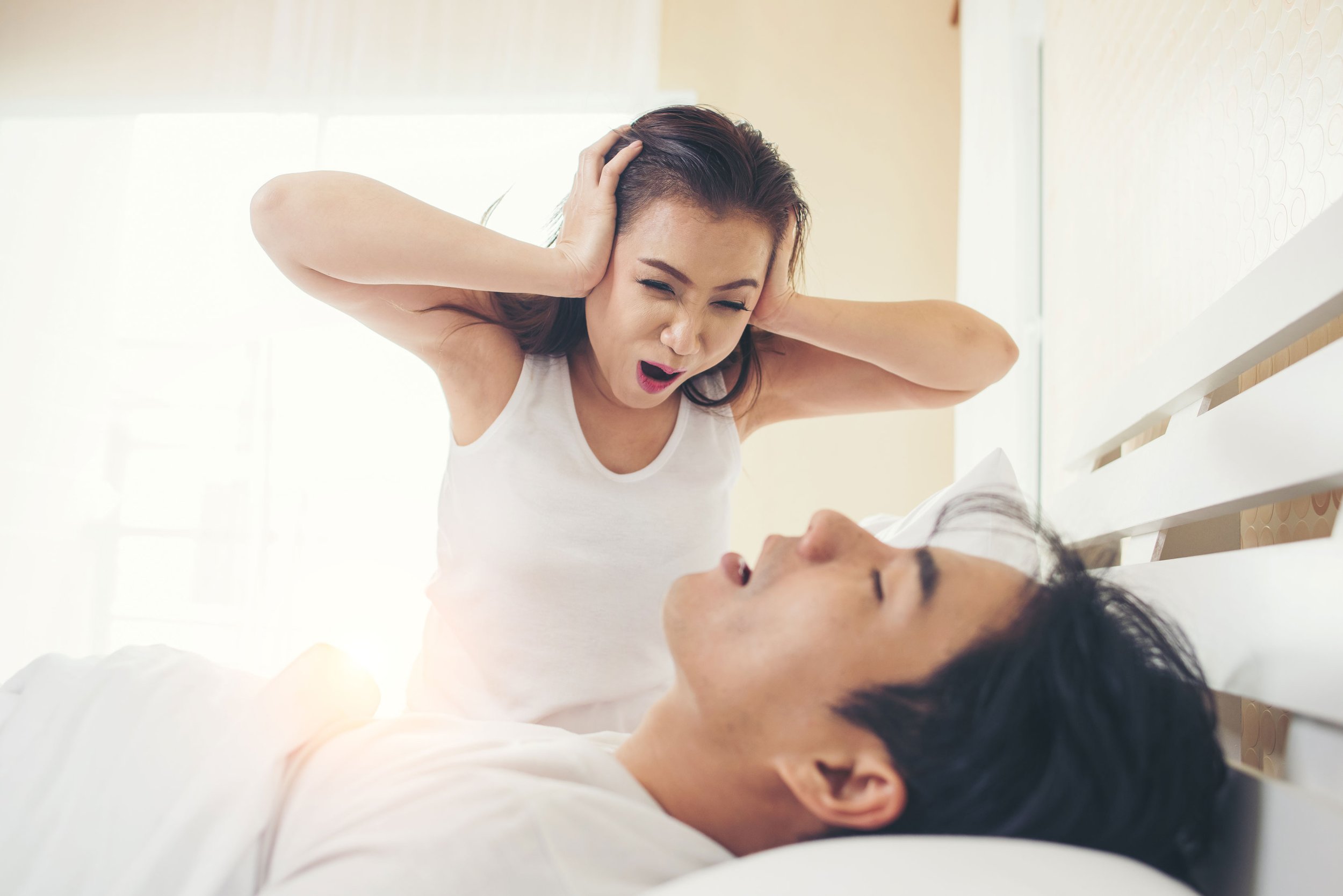
Snoring & Sleep Apnoea in Singapore
Quick Navigation
Occasional snoring is usually harmless. However, loud, persistent snoring may warrant a consultation with an ENT snoring specialist as it can signal a more serious underlying condition like obstructive sleep apnoea (OSA). Understanding the signs and risks of OSA can help you take the next step toward better sleep and health.
Snoring
What is Snoring?
Snoring is a loud, often disruptive noise during sleep when airflow causes tissues in the back of the throat to vibrate. While mostly perceived as a mere nuisance, it could potentially indicate the presence of Obstructive Sleep Apnoea (OSA) - with serious health implications.
Symptoms of Snoring
Snoring can manifest in various ways, often unnoticed by the person affected. Bed partners or family members more commonly observe these symptoms.
Treatment of Snoring
Sleep position can significantly affect snoring levels. Notably, sleeping on your back may worsen snoring due to the tongue falling backwards, narrowing the airway. A potential remedy is to train yourself to sleep on your side. Alternatively, surgery to open up the airway, such as tonsil removal and stiffening of the palate muscles, can treat snoring.
Should I Be Concerned About Snoring?
While occasional snoring is common, loud and chronic snoring with choking episodes can be a sign of Obstructive Sleep Apnea (OSA), a serious condition where breathing repeatedly stops during sleep.
You should consult a doctor if your snoring is accompanied by:
Breathing pauses, gasping, or choking during sleep
Excessive daytime sleepiness or fatigue
Frequent awakenings, irritability, or difficulty concentrating
These symptoms warrant a medical evaluation. Early diagnosis and treatment can help improve your sleep quality, protect your long-term health, and restore your daily energy levels.
Breathe better, Sleep better. Contact Aspire Ear Nose Throat and Snoring Clinic for a consultation today.
Obstructive Sleep Apnoea
What's Obstructive Sleep Apnoea?
Obstructive Sleep Apnoea (OSA) is a sleep disorder that causes the upper airway to constrict excessively during sleep - sometimes to the point of complete blockage. This process is like holding your breath underwater, leading to a severe drop in blood oxygen levels and disrupted sleep, as your brain strives to keep you awake and breathing.
Symptoms of Obstructive Sleep Apnoea
Obstructive Sleep Apnoea has several signs and symptoms, often heard or seen by others long before we recognise them ourselves. It affects both daytime and night-time routines.
During sleep:
Loud, chronic snoring
Intermittent pauses in breathing
Choking or gasping for air
Restless tossing and turning
Getting up to pass urine
During the day:
Morning headaches
Excessive sleepiness
Frequent napping
Difficulty concentrating
It's crucial to understand that not everyone who snores suffers from obstructive sleep apnoea. The diagnosis of sleep apnoea is made only with a polysomnogram or sleep study.
What Are the Causes of Obstructive Sleep Apnoea?
OSA occurs when throat muscles relax during sleep, blocking the airway and causing brief awakenings to resume breathing. Factors that contribute to airway collapse include:
Excess Weight: Fat around the neck can press on the airway.
Large Neck Circumference: Indicates more tissue narrowing the airway.
Structural Issues: Enlarged tonsils, large tongue, or a receding jaw can reduce airway space.
Weak Airway Muscle Tone: Reduced strength in throat muscles can cause collapse.
Fluid Buildup: Conditions like heart or kidney failure may cause neck fluid retention, increasing airway pressure.
Hormonal Changes: Hormonal imbalances can influence the development and progression of obstructive sleep apnoea.
What Are the Risk Factors for Obstructive Sleep Apnoea?
While anyone can develop sleep apnoea, several factors significantly increase one’s risk:
Age: Throat muscle tone weakens with age, increasing the risk of airway collapse.
Gender: Men are more likely to develop OSA.
Family History: Genetics can affect facial and airway structure.
Alcohol and Sedative Use: These relax throat muscles, increasing airway blockage.
Smoking: Causes airway inflammation and reduces muscle reflexes that keep airways open.
Nasal Obstruction or Sinus Issues: Chronic congestion or structural problems can disrupt breathing and increase OSA risk.
What Are the Complications of Obstructive Sleep Apnoea?
Untreated Obstructive Sleep Apnea (OSA) can lead to a range of serious, and sometimes life-threatening, health complications. These include:
High blood pressure (hypertension)
Heart problems like arrhythmias, heart failure, and an increased risk of sudden cardiac death
Pulmonary hypertension
Stroke
Cognitive decline and dementia
Diabetes
Excessive daytime sleepiness
Are you experiencing persistent snoring, daytime fatigue, or witnessed breathing pauses?
Don't let these symptoms go unaddressed. Contact our ENT clinic today for a comprehensive evaluation and personalised care.
How Is Obstructive Sleep Apnoea Diagnosed?
To diagnose sleep apnoea, your doctor will evaluate your symptoms and sleep history. It is very helpful if a bed partner or household member can share observations like loud snoring, gasping, or breathing pauses. Following the initial evaluation, our ENT sleep specialist will determine the need for further testing to confirm a diagnosis and assess the severity of sleep apnoea. The two primary types of sleep tests are:
Polysomnography
Polysomnography is considered the "gold standard" for diagnosing sleep apnoea and other sleep disorders. This comprehensive overnight test is conducted in a hospital, with or without a technician present to monitor your sleep.
During the study, you are connected to sensors that continuously monitor various bodily functions, including:
Brain waves (to identify sleep stages)
Heart rate and rhythm
Blood oxygen levels
Breathing patterns and airflow
Eye movements
Arm and leg movements
This test is particularly recommended when other sleep disorders are suspected or if there is concern about central sleep apnoea.
Home Sleep Apnoea Testing
Home Sleep Apnoea Testing (HSAT) offers a more convenient and cost-effective alternative to an in-lab study, allowing you to perform the test in the comfort of your own home. These simplified tests typically measure key indicators such as heart rate, blood oxygen levels, airflow, and breathing patterns.
While HSATs are convenient, it is important to note that portable monitoring devices can occasionally miss cases of sleep apnoea or other sleep disorders. Therefore, if your symptoms persist or if there is a strong clinical suspicion of sleep apnoea, your healthcare provider may still recommend a polysomnography even if your initial home sleep test results appear normal.
Treatment of Obstructive Sleep Apnoea
Treating Obstructive Sleep Apnoea requires a personalised treatment plan factoring in your individual health history, lifestyle, and severity of symptoms.
Lifestyle modifications such as losing weight, quitting smoking, and limiting alcohol intake. Furthermore, changing your sleep position from lying on your back can alleviate symptoms.
Continuous Positive Airway Pressure (CPAP) therapy that involves wearing a mask over your nose and/or mouth while you sleep, which is connected to a machine that delivers air at high pressures to keep your airways open.
Oral Appliance Therapy which involves custom-fitted dental devices that help keep the airway open.
In certain complex instances, surgery may be recommended to remove excess tissue from the throat or nose, or to reposition the jaw.
Can You Prevent Obstructive Sleep Apnoea?
While not all causes of OSA are preventable, you can significantly reduce your risk and help manage symptoms by adopting certain lifestyle changes:
Achieve and maintain a healthy weight
Consume a balanced diet and exercise regularly
Practice good sleep hygiene
Avoid harmful substances like smoking and alcohol
Manage existing health conditions (hypertension, high cholesterol, type 2 diabetes)
Don't let sleep apnoea continue to compromise your quality of life. Contact Dr Valerie Tay at Aspire ENT Clinic today to discuss your symptoms and explore the most effective treatment options.
FAQs About Snoring & Sleep Apnoea
What’s the difference between snoring and sleep apnoea?
Snoring is the noise from partial airflow resistance in the airway. Sleep apnoea (OSA) occurs when that resistance is severe enough to cause pauses in breathing and decreased oxygenation due to airway collapse.
What is the best position to sleep if you have sleep apnoea?
Some patients have positional OSA, which means that the apnoea improves when they sleep on their side. The best sleep position for sleep apnoea is on your side. Sleeping on your back can worsen snoring and sleep apnoea by allowing your tongue and jaw to fall back and obstruct your airway. Using a special pillow or cushion can help maintain a side-sleeping position.
Do nasal strips work for sleep apnoea?
No, nasal strips are generally not an effective treatment for obstructive sleep apnoea (OSA). While they might offer minor relief for simple snoring by opening nasal passages, they do not address the underlying airway collapse characteristic of OSA. Effective treatment for sleep apnoea is crucial to prevent serious long-term health complications.
Our ENT Surgeon
Dr Valerie Tay
Senior Consultant ENT Surgeon
MBBS (S’pore), MRCS (Edin), MMed (ORL), FAMS
Dr Valerie Tay is a Senior Consultant ENT Surgeon in Singapore with a specialist focus on managing breathing and sleep problems like OSA. She works closely with patients experiencing snoring and sleep-related breathing difficulties to identify and manage underlying ENT causes. Beyond clinical work, Dr Tay has played a key role in ENT specialist training, as a former President of the ENT Society and core faculty member of the National Health Group (NHG) residency programme. She continues to share her expertise through workshops and conferences to improve patient care.
Don't let ENT conditions hold you back.
Connect with us at Aspire ENT clinic today, and take the first step towards a better quality of life.
If you are experiencing any concerns related to your Ear, Nose, or Throat health, contact us at Aspire Ear, Nose Throat and Snoring Clinic. Dr Valerie Tay is here to help you breathe well, sleep well, eat well, and live well.
Aspire Ear, Nose, Throat and Snoring Clinic
Mount Elizabeth Medical Centre #06-10,
3 Mount Elizabeth, Singapore 228510
Opening Hours (by appointment only)
Monday to Friday: 9 AM to 4.30 PM
Saturday: 9 AM to 12 PM
Sunday and Public Holidays: Closed
Contact Details
Tel: +65 6592 2118
Mobile: +65 9358 8060
Email: enquiry@aspire-ent.sg




